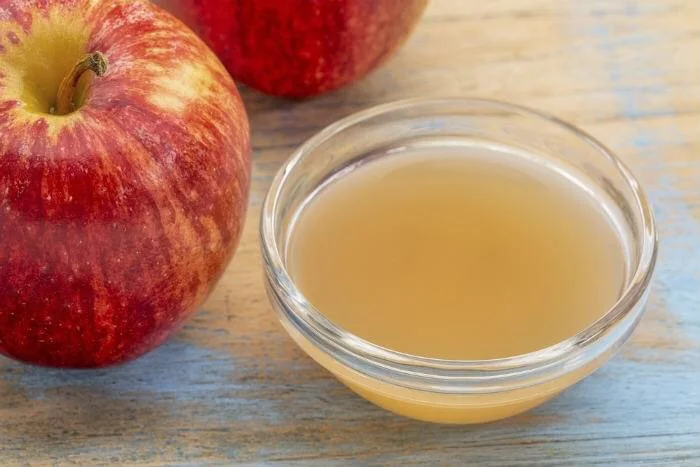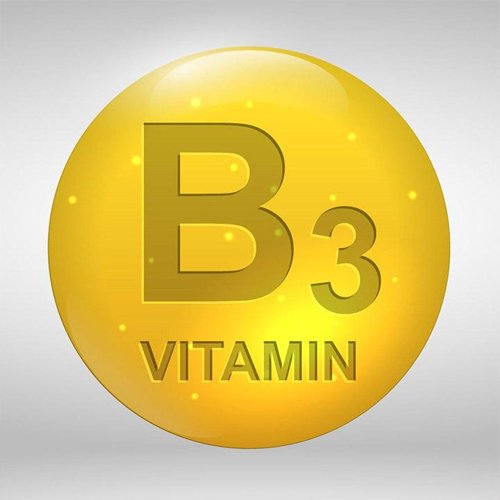Table of Contents
Tried apple cider vinegar for bloating but still not finding relief? You’re not alone! Many people struggle with low stomach acid, and simply adding ACV might not be enough. In this article, we’re diving into the surprising connection between chronic bloating, low stomach acid, and vitamin B3 deficiency. We’ll explore the symptoms, explain why this happens, and give you actionable steps to finally beat the bloat.
Vitamin B3 Plays a Key Role in Your Stomach Acid
Hey guys, today we’re gonna talk about something quite interesting: the relationship between vitamin B3 and your stomach acid. Now, I’ve done a lot of topics on stomach acid and acid reflux and the gallbladder and digestion, and I’ve also recommended that you take apple cider vinegar or betaine hydrochloride to help you with low stomach acid, which is very common. But I haven’t talked about vitamin B3 helping that condition.
- Relationship between vitamin B3 and stomach acid
- Previous recommendations: apple cider vinegar and betaine hydrochloride
- Introduction to vitamin B3’s role in stomach acid production
These Are the Symptoms of Low Stomach Acid
First of all, you’re not going to absorb minerals that well, so you might be deficient in iron or calcium or any of the minerals, okay?
Number two, decreased amino acid absorption. This can show up in many things from hair loss to loose skin to an incomplete digestion of protein that causes gas, okay?

Next one, leaky gut, which can lead to allergies.
Then we get probably the most common one, which is just bloating in general or even abdominal pain and acid reflux.
SIBO, small intestinal bacterial overgrowth, occurs as well when you have low stomach acid, and that’s where you have bacteria growing in the wrong place.
It’s growing in the small intestine, not the large, and every time you consume anything with fiber, it gets worse.
You can’t consume a lot of salad, for example, without being bloated.
Also, if you take probiotics, it makes it worse because it’s not necessarily you have all bad bacteria in your small intestine, could be good bacteria, it’s just overgrowing in the wrong place.
And these microbes are eating up all all your nutrition, so you’re going to usually have nutritional deficiencies just from that alone.
And you can also have an infection lower in the digestive tract because the purpose of hydrochloric acid, one big purpose, is to kill off the pathogens so they don’t go through the stomach into the small intestine to the large intestine.

So you can have an infection down there and that can create an immune problem and lead to all sorts of issues, constipation and even diarrhea because you’re not able to digest properly.
Gallbladder sluggishness, so your gallbladder doesn’t release and you always feel bloated on the right side and you’re getting problems with the digestion of fat. So these are all the symptoms that can occur when you don’t have hydrochloric acid.
- Poor mineral absorption (iron, calcium, etc.)
- Decreased amino acid absorption (hair loss, loose skin, gas)
- Leaky gut and allergies
- Bloating, abdominal pain, and acid reflux
- SIBO (Small Intestinal Bacterial Overgrowth)
- Nutritional deficiencies
- Increased risk of infections in the digestive tract
- Constipation and diarrhea
- Gallbladder sluggishness
- Problems with fat digestion
I Explain What You Can Take to Improve Your Stomach Acid

Now you can actually take betaine hydrochloride, apple cider vinegar to improve the acidity in your stomach.
Even, by the way, fasting improves hydrochloric acid. I’m drinking coffee, will do it.
But vitamin B3, niacin, will help you make more stomach acid.
So if you’re deficient in B3, the common symptoms would be depression, anxiety, fatigue, skin problems, and diarrhea.
But think about it, B3 is involved in over 300 enzymes in your body. It’s like a cofactor, it’s a helper to make these enzymes.
There’s a lot of things that happen with vitamin B3. But if you have a subclinical deficiency, so you have B3 but it’s just not enough, but the body will use B3 in a certain priority system, okay?

So it might handle your depression and anxiety and fatigue and prevent diarrhea, but it might not be able to make hydrochloric acid because the body might not consider hydrochloric acid production as the priority and these take over.
So if you’re deficient in B3, you may not have all of the deficiency symptoms, just a few.
But there’s a condition called B3 dependency, okay? And basically what that is is this: your body just needs more B3, okay?
Whether it’s stress causing this or certain microbes that are depleting your reserve, these two can be underlying causes of why you just basically need more B3.
So it can be a subclinical thing or just basically the stress is causing you to need more of it.
- Betaine hydrochloride and apple cider vinegar can improve stomach acidity
- Fasting and coffee can also improve hydrochloric acid production
- Vitamin B3 (niacin) helps make more stomach acid
- B3 deficiency symptoms: depression, anxiety, fatigue, skin problems, diarrhea
- B3 is involved in over 300 enzymes in the body
- Subclinical B3 deficiency may not show all symptoms
- B3 dependency: condition where the body needs more B3
- Stress and certain microbes can deplete B3 reserves
You Need B3 to Replenish Adrenaline, Especially When You’re Under Stress
And when you’re under stress, your body uses up the adrenaline, it oxidizes adrenaline, and B3 is very necessary to replenish adrenaline.
Also, you have another source of B3, which is tryptophan. Tryptophan can convert to B3.
So let’s say, for example, you don’t have enough HCl to even help you absorb tryptophan, this might not occur.
So there are reasons that go beyond just a lack of dietary B3, okay?
So you just might need more because your body’s really stressed out.
B3 is necessary in the production of ATP, which is the energy currency of the mitochondria in the stomach cells.
And these stomach cells make hydrochloric acid.
So if you don’t have enough B3 and your cells can’t make enough hydrochloric acid, you will start experiencing some of these symptoms right here.
Maybe not these, but these over here.
So you watch my topic and I tell you to drink apple cider vinegar and it doesn’t work.

Well, guess what? You need B3, okay?
So if you suspect having this, I’m gonna recommend taking a higher dose, between 50 and 100 milligrams per day.
Some people that are really stressed need to take this three times a day to see the change.
If you’re in the situation and you have some of these symptoms, you don’t feel like your stomach’s quite right, you have stomach troubles, and you’re already doing all the other things that I’m recommending, you may want to take niacin, okay, in this amount right here and see if this is the reason why you have that problem.
- B3 is necessary to replenish adrenaline during stress
- Tryptophan can convert to B3
- Low HCl can affect tryptophan absorption and B3 conversion
- B3 is necessary for ATP production in stomach cells
- Lack of B3 can lead to insufficient hydrochloric acid production
- Recommended B3 dosage: 50-100 milligrams per day
- Some people may need to take B3 three times a day
- Consider taking niacin if other remedies don’t work
SUmmary
In this topic, I explain the relationship between vitamin B3 and your stomach acid. I’ve done a lot of topics on stomach acid, acid reflux, the gallbladder, and digestion. I’ve also recommended you take apple cider vinegar or betaine hydrochloride to help you with low stomach acid, which is very common. But I haven’t talked about vitamin B3 helping this condition.
These are the symptoms of low stomach acid:
● Inability to absorb minerals, leading to a potential deficiency of iron, calcium, or any other minerals
● Decreased ability to absorb amino acids, which can show up as hair loss, loose skin, or incomplete digestion of protein, among other things
● Leaky gut, which can lead to allergies
● Bloating, abdominal pain, and acid reflux
● SIBO, small intestine bacterial overgrowth, when bacteria grow where they shouldn’t, in your small intestine, and whenever you consume fiber or probiotics it gets worse
● An infection in your lower digestive tract
● Constipation or diarrhea
● Sluggish gallbladder
You can take betaine hydrochloride or apple cider vinegar to improve stomach acid. Fasting also helps, as does drinking coffee. But so too does taking vitamin B3 (niacin).
Common symptoms of B3 deficiency include anxiety, depression, fatigue, and skin problems, which the B3 you do have will address first, possibly preventing it from making more stomach acid. There’s a condition called B3 dependency, which may be caused by stress or certain microbes. When you’re stressed, your body oxidizes adrenaline and needs B3 to replenish it. And because tryptophan converts to B3, you need enough stomach acid to do so.
As well, you need B3 to produce the energy called ATP from the mitochondria in your stomach cells. If you think you have low stomach acid, I recommend you take 50 to 100 milligrams of vitamin B3 per day, or more if you’re really stressed.
FAQ
How much apple cider vinegar do I take for gas and bloating?
For gas and bloating, it is commonly recommended to take 1 to 2 tablespoons of raw, unfiltered apple cider vinegar (ACV) mixed with 8 ounces of water. This can be consumed once or twice daily, preferably before meals. However, individual responses may vary, and it’s important to start with smaller amounts to assess tolerance[1][5].
Can apple cider vinegar cause constipation?
There is no strong scientific evidence supporting apple cider vinegar as a remedy for constipation. In fact, some studies suggest that it may worsen symptoms in certain individuals, particularly if consumed in excess. ACV can potentially slow gastric emptying, leading to increased gas and bloating, which might contribute to constipation rather than alleviate it[1][3][6].
Does apple cider vinegar clean your intestines?
The idea that apple cider vinegar can “clean” your intestines is largely anecdotal and not supported by scientific research. While ACV is believed to have antimicrobial properties that may benefit gut health, there is no conclusive evidence that it effectively detoxifies or cleanses the intestines. The body naturally detoxifies itself, and a balanced diet is more effective for gut health[5][6].
Why am I bloated after drinking apple cider vinegar?
Bloating after consuming apple cider vinegar may occur due to its acidity, which can irritate the stomach lining or intestines, especially if taken in large quantities. Additionally, if ACV slows down gastric emptying, it may lead to increased gas production and bloating. Individuals with sensitive stomachs or underlying digestive issues may be more susceptible to these effects[1][4][6].
What drink gets rid of bloating immediately?
While there is no single drink that universally alleviates bloating, many people find relief from herbal teas, such as peppermint or ginger tea, which can help soothe the digestive system. Additionally, warm water with lemon or a mixture of water and a small amount of baking soda may provide quick relief for some individuals[7].
How to reduce bloating immediately?
To reduce bloating quickly, consider the following strategies:
- Drink warm herbal teas (peppermint or ginger)
- Stay hydrated with water to help digestion
- Avoid carbonated beverages that can introduce gas
- Engage in light physical activity like walking to stimulate digestion
- Try over-the-counter remedies containing simethicone, which can help reduce gas[7].
Does apple cider vinegar cause gas and bloating?
Apple cider vinegar can cause gas and bloating in some individuals, particularly if consumed in large amounts or on an empty stomach. Its acidity may irritate the digestive tract, leading to discomfort. Additionally, ACV might slow down gastric emptying, potentially worsening bloating and gas in sensitive individuals[1][4][6].
Apple cider vinegar for bloating and weight loss
While some anecdotal evidence suggests that apple cider vinegar may aid in weight loss by promoting feelings of fullness and reducing appetite, scientific studies are limited. Its effectiveness for bloating relief is also not well-supported. It may help some people with digestion, but results can vary widely[2][5].
How to take apple cider vinegar for gut health
To support gut health, dilute 1 to 2 tablespoons of raw, unfiltered apple cider vinegar in 8 ounces of water and consume it before meals. This method helps minimize the acidity’s impact on your stomach. Additionally, incorporating ACV into salads or smoothies can provide a more palatable way to enjoy its potential benefits[1][5].
Apple cider vinegar for bloating and gas
Apple cider vinegar may help some individuals with bloating and gas by potentially increasing stomach acid and aiding digestion. However, its effectiveness varies, and excessive consumption can lead to increased bloating and gas instead. It’s advisable to monitor your body’s response and consult a healthcare provider if symptoms persist[1][4].
7 reasons you need to drink apple cider vinegar every night before bed
- May aid digestion: Some believe it helps break down food.
- Potential weight loss support: It may promote feelings of fullness.
- Blood sugar regulation: Some studies suggest it may help stabilize blood sugar levels.
- Antimicrobial properties: ACV may help balance gut bacteria.
- Heart health: It may contribute to lower cholesterol levels.
- Skin health: Some use it for its potential skin benefits.
- Detoxification: While not scientifically proven, it is often touted for cleansing the body[5][6].
Does apple cider vinegar make you pass gas?
Apple cider vinegar can lead to increased gas production in some individuals, particularly if it irritates the digestive system or slows gastric emptying. If you notice an increase in gas after consuming ACV, it may be best to reduce the amount or frequency of intake[1][4].
Apple cider vinegar benefits
The potential benefits of apple cider vinegar include:
- Improved digestion: May help with stomach acid levels.
- Weight management: Can promote satiety.
- Blood sugar control: May help lower blood sugar spikes.
- Antimicrobial effects: Could support gut health.
- Skin benefits: Used in some skincare routines[2][5].
Apple cider vinegar for gas and constipation
While some people use apple cider vinegar as a home remedy for gas and constipation, scientific support for its effectiveness is limited. It may help some individuals by promoting digestion, but it can also exacerbate symptoms in others. It is advisable to consult a healthcare professional for persistent digestive issues[3][6].




